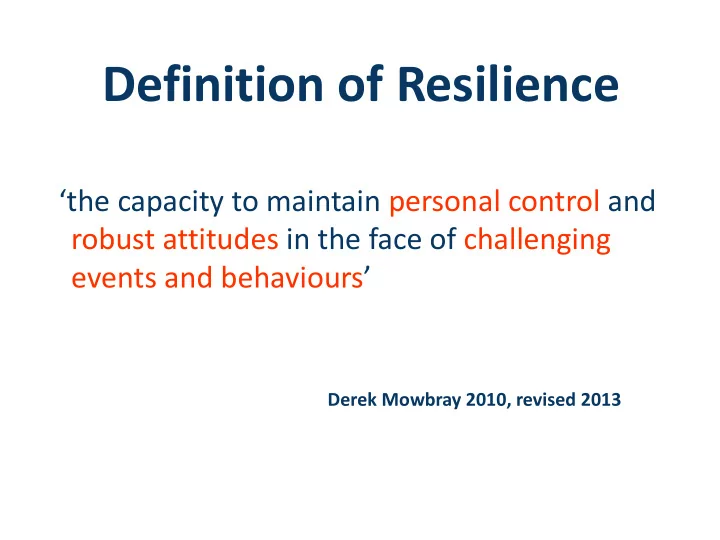

Definition of Resilience ‘the capacity to maintain personal control and robust attitudes in the face of challenging events and behaviours ’ Derek Mowbray 2010, revised 2013
Resilience • “The ability to mitigate the effects of stress i.e factors such as emotional, cognitive, physiological, behavioural responses to work, the work environment or the organisations”. Levi, 2000 EU Guidance on Work Related Stress
Resilience is: ‘Resilience comprises a set of flexible cognitive, behavioural and emotional responses to adversities. It can be learned and within the grasp of everyone. The most important self-development factor is the attitude adopted to deal with adversity. Attitude (meaning) is at the heart of resilience. Neenan & Dryden, 2009
Not all mental health problems are preventable just like some other long-term conditions i.e cancers. However, there are some things we can do to look after our mental health, for example, promoting mental wellbeing and building resilience and managing stress Key areas in the session today are; resilience, stress and mental wellbeing
What might lower resilience? • Major life events and trauma exposure (bereavement, divorce, new baby, moving house, new job, debt, threat of/or redundancy, under-employment, organisational change) • Micro-stressors • Life stages • Poor coping skills • Lack of social support network • Illness • Lifestyle factors (lack of exercise, poor nutrition, smoking, alcohol overuse or other recreational drugs, poor sleep) • Unrealistic beliefs and negative thinking
What might increase resilience? • Applying coping skills to life events and changes • Assertiveness, confidence and self esteem/self acceptance • Support network (friends, family, colleagues, teams) • Asking for help/advice • Talking to someone about your problems/how you’re feeling • Being physically active (how) • Healthy eating and drinking within recommended alcohol guidelines • Relaxation and sufficient sleep ( what is sufficient sleep) • Getting involved and acquiring new skills/being creative • Positive and realistic outlook
Resilience Dimensions 1. Self Efficacy: Having the confidence and self-belief that challenges can be met along with the ability to succeed. 2. Personal vision: Awareness of beliefs and goals to navigate thro’ life challenges. Realistic hope for the future. 3. Flexible and Adaptable: Adapts to the new reality, seeking ways to overcome events. 4. Organised: Creating a structured approach to tasks, adding to personal control. Derek Mowbray, 2010
5. Problem Solving: Finds causes and solutions to adverse events. Enjoys the challenge?. 6. Interpersonal Competence: Understands and empathises. Emotional Intelligence. A high level of self and social awareness to effectively manage self and relationships. 7. Socially Connected: Quality personal and professional relationships. Shares ideas, hopes, problems, frustrations and solutions. 8. Active in change: Actively engages in and contributes to change. Maintains personal control thro’ assertiveness and self-efficacy. Derek Mowbray, 2010
Recommend
More recommend